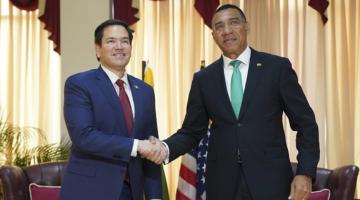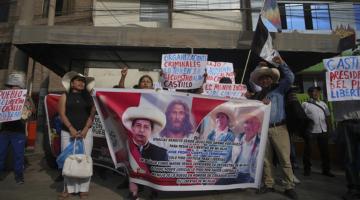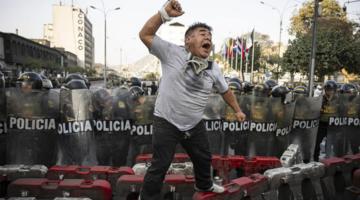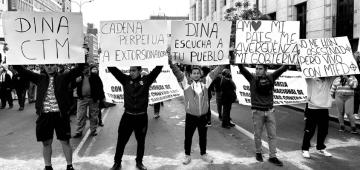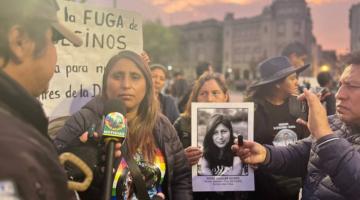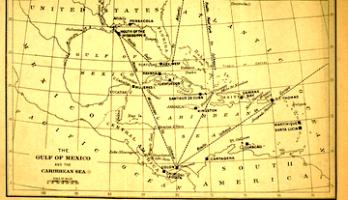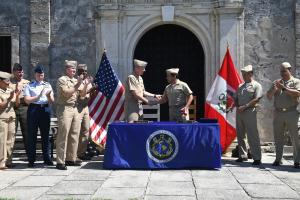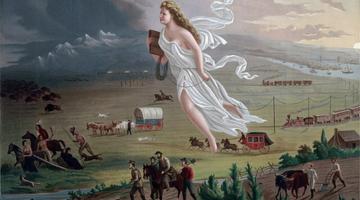Protesters march in Lima in December 2022 (Mayimbú / Wikimedia Commons / CC BY-SA 4.0)
On the anniversary of the Monroe doctrine, the struggle against the repressive Boluarte coup in Peru regime enters its second year.
National Strike, Day 364
**en español abajo**
Tomorrow, December 7th, 2023, marks the one-year anniversary of the US backed right-wing parliamentary coup that ousted democratically elected president Pedro Castillo Terrones. The past 364 days have been some of the bloodiest, most repressive, and tumultuous in recent Peruvian history and the blood continues to be spilled. The US-backed Boluarte regime, led by the Fujimorista right-wing Congress, now has the blood of over 100 martyrs on its hands, with thousands severely injured, imprisoned, and tortured, and many more disappeared. There has yet to be justice in any of these cases as the prosecutor’s office becomes mired in corruption charges and telenovela-styled backstabbing between the executive power, the judicial powers, and members of Congress.
The coup regime seems to be on fragile footing, but will the mobilized masses on the ground be able to materialize and overthrow this dictatorship while navigating contradictions and opportunism? And will national and international legal systems hold any weight under a US/Western-backed regime? The people who have been in the struggle this past year say this process of grand transformation, of an anti-colonial national liberation character that goes beyond a president and to the very foundation of a people's government, continues on despite political theater that amounts to a smoke screen to allow for what many fear is the escape of individuals in the coup regime from the country, especially Dina Boluarte, Alberto Otárola, Patricia Benavides or even Keiko Fujimori. Perhaps the most fundamental of the demands this past year has been the popular constituent assembly to nationalize and industrialize natural resources for the benefit of the largely indigenous, agricultural workers of the Andes and the poor, precarious class in urban areas. Throughout the country the riches of the lands are in the hands of a few in Miraflores, San Isidro, La Molina, and other wealthy areas of Lima, where the diplomats of the countries running Peru reside, and where the heads of the wealthiest companies who don’t pay their workers a living wage or even taxes live comfortably.
Sunday, December 3rd was the start of the agricultural strike in Barrio Chino, Ica, where agricultural workers and others began the week-long activities of struggle at the start of the anniversary of the coup. Roadblocks on the PanAmericana Sur began early in the morning and confrontations with armed forces escalated quickly. According to sources on the ground, at least one person has been killed and two injured. Ica also faced heavy state repression since the early days of the coup regime as one of the first regions to militantly stand against the regime, with political prisoners still behind bars.
The next day, December 4th was the public hearing for multiple habeas corpus lawsuits filed on behalf of Pedro Castillo, still in pre-trial detention, in the Constitutional Tribunal (TC). From Penal Barbadillo, accompanied by one of his lawyers Wilfredo Robles, Castillo stated,
"They have arrested me and violated my rights. This was ordered by the Prosecutor of the Nation, who today is revealed as the leader of a criminal organization, in coordination with senior officials of the Peruvian National Police (PNP) and some congressmen. All this in order to overthrow my government because I do not belong to this elite and they do not agree with my origins"
Supporters of Pedro Castillo camped outside the TC as they waited to hear from the president’s lawyers. Among the arguments given by the defense was that the impeachment process violated the Constitution, and that Castillo’s habeas corpus rights have been trampled on since December 7th, 2022. Former Bolivian President Evo Morales Ayma stated on social media that there was an elaborate congressional-prosecutor-military-police plot against Castillo, as in Bolivia in 2019, with Washington and SOUTHCOM pulling the strings.
Official days of struggle have been declared for December 7th, 8th, and 9th both in Lima and throughout the 25 regions of the country, also in the backdrop of the habeas corpus case and ongoing Palestinian solidarity mobilizations. Peruvians in the international diaspora also plan on holding rallies outside embassies and consulates, as well as webinars and public forums to educate and a Palestinian solidarity vigil in Washington Square Park, New York City to honor the over 100 martyrs of Peru and the over 20,000 Palestinian martyrs in the ongoing genocide in Gaza. As peoples who have shared paths that predate the Zionist entity, as seen in the Cristo Blanco statue in iCusco that “shows Jesus Christ with open arms towards the city and was erected in 1945 as a gift to the city from the Palestinian Arab Community residing in Cusco.” Marches and mobilizations in Lima, Cusco, and other locations were led by associations and collectives of Palestinian Peruvians and those in solidarity with the Palestinian cause, including at the Cristo Blanco statue, indignant over the ongoing genocide and ethnic cleansing campaign, as well as the Boluarte regime’s purchase of Israeli firearms.
Those on the ground in the struggle throughout the 25 regions and in the over 50 languages in our plurinational country understand it is a protracted struggle, but the contradictions can only fall under their own weight and soon the masses will come back to power. The task is building bases barrio by barrio, region by region to construct a true Zone of Peace in Peru, one that rejects US and Western imperialism and neocolonialism that has kept our people under the boot of the Monroe Doctrine. On the 200th anniversary of this Yankee imposed doctrine that has manifested itself through our lands in gruesome ways, the sovereign peoples demand a true and just Zone of Peace in Peru and in Nuestra América, our America.
Un Año En Insurgencia: Primer Aniversario del Régimen Golpista Marca el Día Internacional de Solidaridad con el Pueblo Peruano
Paro Nacional, Día 364
Mañana, 7 de diciembre de 2023, se cumple un año del golpe parlamentario de la ultraderecha respaldado por EEUU que derrocó al presidente democráticamente electo Pedro Castillo Terrones. Los últimos 364 días han sido algunos de los más sangrientos, represivos y tumultuosos de la historia reciente del Perú y la sangre continúa derramándose. El régimen de Boluarte, respaldado por EEUU y el Occidente, dirigido por el Congreso fujimorista, tiene ahora en sus manos la sangre de más de 100 mártires, miles gravemente heridos, encarcelados y torturados, y muchos más desaparecidos. Aún no ha habido justicia en ninguno de estos casos, mientras la fiscalía de la Nación se ve envuelta en corrupción y puñaladas por la espalda al estilo de una telenovela entre el poder ejecutivo, el poder judicial y los miembros del Congreso.
El régimen golpista parece estar a punto de caerse, pero ¿podrán las masas movilizadas en las calles materializar y derrocar esta dictadura mientras navegan por las contradicciones y el oportunismo? ¿Y tendrán algún peso los sistemas legales nacionales e internacionales bajo un régimen respaldado por EEUU y Occidente? Las personas que han estado en la lucha este año pasado dicen que este proceso de gran transformación, de carácter anticolonial de liberación nacional que va más allá de un presidente y hasta la base misma de un gobierno popular, continúa a pesar de un teatro político que en sí es una cortina de humo, pantalla para permitir lo que muchos temen sea la fuga del país de individuos del régimen, especialmente Dina Boluarte, Alberto Otárola, Patricia Benavides o hasta Keiko Fujimori. Quizás la más fundamental de las demandas del año pasado haya sido la asamblea popular constituyente para nacionalizar e industrializar los recursos naturales en beneficio de los trabajadores agrícolas de los Andes, en su mayoría de comunidades originarias, y de la clase obrera y precaria de las zonas urbanas. En todo el país las riquezas de las tierras están en manos de unos pocos en Miraflores, San Isidro, La Molina y otras zonas pitucas de Lima, donde residen los diplomáticos de los países que dirigen el Perú, y donde los jefes de las empresas más ricas que no pagan a sus trabajadores un salario digno para vivir cómodamente ni los impuestos.
El domingo 3 de diciembre fue el inicio del paro agrícola en Barrio Chino, Ica, donde los trabajadores agrícolas y otros comenzaron las actividades de lucha de una semana al inicio del aniversario del golpe. Los controles de carreteras en la PanAmericana Sur comenzaron temprano en la mañana y los enfrentamientos con las fuerzas armadas se intensificaron rápidamente. Según fuentes en la lucha , al menos una persona ha muerto y dos han resultado heridos. Ica también enfrentó una represión brutal desde los primeros días del régimen como una de las primeras regiones en oponerse militantemente al gobierno usurpador, con presos políticos todavía detenidos.
Al día siguiente, 4 de diciembre, se llevó a cabo la audiencia pública por múltiples demandas de hábeas corpus interpuestas a favor de Pedro Castillo, aún en prisión preventiva, en el Tribunal Constitucional (TC). Desde Penal Barbadillo, acompañado de uno de sus abogados Wilfredo Robles, Castillo declaró,
"Me han arrestado y violentado mis derechos. esto fue ordenado por la fiscal de la Nación, quien hoy se revela como líder de una organización criminal, en coordinación con altos mandos de la Policía Nacional del Perú (PNP) y algunos congresistas. Todo esto con el fin de derrocar mi gobierno debido a que no pertenezco a esta élite y no están de acuerdo con mis orígenes."
Apoyantes de Pedro Castillo acamparon afuera del TC mientras esperaban noticias de los abogados del presidente. Entre los argumentos dados por la defensa estuvo que el proceso de vacancia violó la Constitución, y que los derechos de habeas corpus de Castillo han sido pisoteados desde el 7 de diciembre de 2022. El expresidente boliviano Evo Morales Ayma afirmó en redes sociales que había un elaborado complot congresal-fiscal- militar-policial contra Castillo, como en Bolivia en 2019, con Washington y el Comando Sur dirigiendo de atrás.
Se han declarado días oficiales para la jornada de lucha para el7, 8 y 9 de diciembre tanto en Lima como en las 25 regiones del país, también en el contexto del caso de hábeas corpus y de las movilizaciones de solidaridad con Palestina. Los peruanos en el extranjero también planean realizar manifestaciones frente a embajadas y consulados, así como foros híbridos para educar las bases y una vigilia de solidaridad con Palestina en la Plaza Washington en la ciudad de Nueva York para honrar a los más de 100 mártires en Perú y a los más de 20.000 mártires palestinos en el actual genocidio en Gaza. Como pueblos que tienen lazos historicas antes de la creacion de la entidad sionista, como se ve en la estatua del Cristo Blanco en Cusco que “muestra a Jesucristo con los brazos abiertos hacia la ciudad y fue erigida en 1945 como un regalo a la ciudad por parte de la Comunidad Árabe Palestina residente en Cuzco.” Las marchas y movilizaciones en Lima, Cuzco y otros lugares fueron encabezadas por asociaciones y colectivos de palestinos peruanos y personas solidarias con la causa palestina, incluida la estatua del Cristo Blanco, indignados por el genocidio y la campaña de limpieza étnica actualmente ocuriendo, así como por la compra de armas de fuego israelíes por parte del régimen de Boluarte.
Quienes están en la lucha en las 25 regiones y en los más de 50 idiomas de nuestro país plurinacional entienden que es una lucha prolongada, pero las contradicciones sólo pueden caer por su propio peso y pronto las masas volverán al poder. La tarea es construir bases barrio por barrio, región por región para construir una verdadera Zona de Paz en el Perú, que rechace el imperialismo y el neocolonialismo radiando de influencia estadounidense y occidentales como las academias Eurocéntricas que ha vendido a nuestro pueblo bajo la bota de la Doctrina Monroe. En el aniversario 200 de esta doctrina impuesta por los yanquis que se ha manifestado sobre nuestras tierras de manera espantosa, los pueblos soberanos exigen una verdadera y justa Zona de Paz en el Perú y en toda Nuestra América.
Clau O'Brien Moscoso is an organizer with the Black Alliance for Peace in the Haiti/Americas Team. Originally from Barrios Altos, Lima, she grew up in New Jersey and now lives between both countries.

